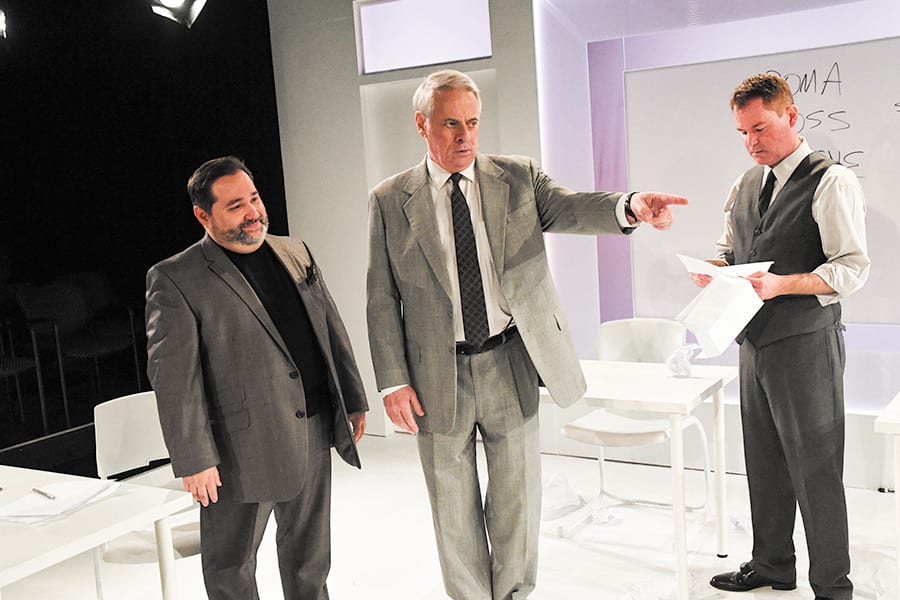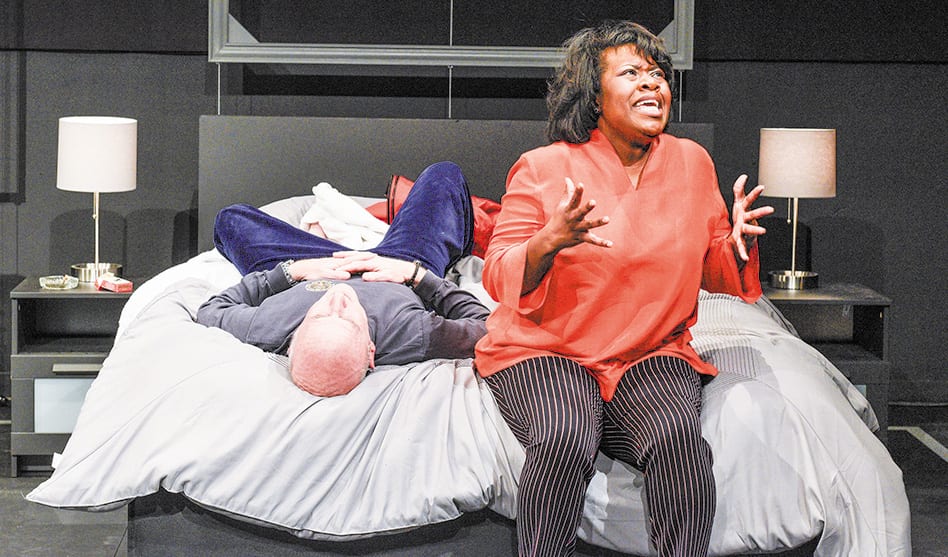‘Glengarry’ sells itself; Hillary loses (again)
ARNOLD WAYNE JONES | Executive Editor
jones@dallasvoice.com
 Lucy Van Pelt told Charlie Brown you’re not anybody until you’ve appeared on a bubblegum card. Screw that. The… no, listen, I … hey, wait, pay atten… I talk– I said I’m talking to you, asshole! Damn! Pay fricking attention why dontcha…. Now, as I was saying …. You’re not anybody until your name becomes an adjective.
Lucy Van Pelt told Charlie Brown you’re not anybody until you’ve appeared on a bubblegum card. Screw that. The… no, listen, I … hey, wait, pay atten… I talk– I said I’m talking to you, asshole! Damn! Pay fricking attention why dontcha…. Now, as I was saying …. You’re not anybody until your name becomes an adjective.
And that’s David Mamet.
The playwright, who turned the use of profanity framed by ellipses into something akin to high art, luxuriates in language the way a hitman luxuriates in high-calibre ordnance. He uses words as both swords and grenades, lobbing invectives across the stage as characters reveal themselves through manipulative explosions of anger, threat … and, I’m sure once or twice, affection.

A gang of ruthless real estate salesmen (Joe Messina, Mark Oristano, Shane Beeson) spew bile in the Mametian ‘Glengarry Glen Ross.’ (Photo courtesy Kris Ikejiri)
One shaft of fleeting bromantic admiration is apparent in Glengarry Glen Ross, the company-launching debut from the new Imprint Theatreworks, operating out of the Bath House Cultural Center. One uber-salesman, Ricky Roma (Joe Messina), understands the balls and vulnerability that come with convincing folks with disposable income to spend their money with you.
He sees in Shelley “The Machine” Levene (Mark Oristano) a fellow traveler — one who has been on a cool streak of late, to be sure, but a man who has achieved something special in life selling Florida retirement properties to nervous Chicagoans with undesignated cash. Attention, attention must be paid to such a man.
Since its debut (can it be?!) 35 years ago, Glengarry has been the gold standard against which ruthlessness is embraced in the theater, but really, it’s the flip side to Arthur Miller’s Death of a Salesman. In Miller’s version, we virtually never see Willy Loman ply his trade, merely the effects of his downfall. Glengarry catches its Willys during their rise, plateau and slide, and adds on it the acknowledgment of the cyclical nature of the Lomans in our midst. Even a great era must pass. (Evidence: Our current presidency.)
Glengarry Glen Ross is arguably a flawless play but which, paradoxically, is nearly impossible to do right. You need actors attuned to the archness of Mamet’s obsessive punctuation and his unyielding sense of the sound of a play. His characters emerge less from exposition (you can barely ever trust the words coming out of a Mamet character), but the manner in which they talk — the patter, the word choice, the speed. So, we know Roma is smooth because of the oily but unexpected way he sidles up to a mark (pardon — a “client”) in a Chinese restaurant; that Aaronow (Lon Barrera) is a soft-sell weakling because of how he addles and fixates; that Moss (Kevin Moore) is bravado masking insecurity; and that Levene is the embodiment of sweaty desperation twinged by the memory of former greatness. When the real estate office they all work at is burglarized, the list of premium “leads” (people likely to invest in land) purloined, we know one or more of them did it; it’s seeing how they all cope with the accusations that we learn about them. (Character, they say, is what you do when nobody is watching; fuck that, it’s what they do when accused of a crime.)
Mamet is as ruthless with his storytelling economy — and apparent opinion about the human animal — as these characters are with other human beings. They are like manifestations of the writer’s own personality — neuroses made flesh. That’s a narrow window to shoot an arrow through, but director Ashley H. White manages it with her tight cast. North Texas newcomer Messina is more roly-poly than other Romas I’ve seen, but he makes it work with his variation of the Jedi mindfuck; Ian Meade Moore as the milquetoast victim of his pitch is poignantly sympathetic. But Oristano — tall but somehow not imposing, gray-haired and defeated but with the fight of a junkyard dog still in him — gives the show’s best performance. He’s like the high school football star who lives in his past glories, but for whom the stakes are higher than mere ego. Sales are life for him, literally. The profane, volatile vulgarities of Mamet’s aggression can’t mask the tragedy at its heart. Glengarry Glen Ross is a bleak comedy about the fear of becoming obsolete. Its message has rarely felt more pertinent.
 Hillary and Clinton portrays a tragedy of different kind. In author Lucas Hnath’s construct, the universe is filled with infinite Earths with differences major and minor, including ones where a former First Lady named Hillary is black, her husband Bill is as much liability as advisor, her opponent in the 2008 primaries is a black man, and she never gets to be president.
Hillary and Clinton portrays a tragedy of different kind. In author Lucas Hnath’s construct, the universe is filled with infinite Earths with differences major and minor, including ones where a former First Lady named Hillary is black, her husband Bill is as much liability as advisor, her opponent in the 2008 primaries is a black man, and she never gets to be president.Ummm… how is that, really, different from this universe.
And thus the conundrum of Hnath’s play, which opened Second Thought Theatre’s 2018 season. He gives himself free rein to rewrite world history to his liking, and what does he do? Tweak this, nip that, spin here, change here and then leave everything more or less the same. So the question is, why? Why pretend these are the Clintons-only-not-the-Clintons when you could fictionalize like a “ripped from the headlines” episode of Law & Order, or research the actual events and try to explain them? Hillary and Clinton feels lazy — a writer who wanted to opine about recent politics without the requirement to fact-check or get permissions.
Simply not enough happens to keep our interest for 85 uninterrupted minutes in uncomfortable chairs. I don’t blame the cast — Stormi Demerson as Hillary, Jim Kuenzer as her campaign manager, Barry Nash as Bill (but not Bill!) and Sam Henderson as “The Other Guy” — who all seem to acquit themselves of what the script requires. But Hnath toggles meaninglessly between directly addressing the audience to restoring the fourth wall to breaking the artifice of the play construct itself and does so with virtually nothing happening onstage. H&C is as stiff as any play I’ve seen, and it doesn’t do anything to upend its characters in profound ways. Mamet transforms words into actions; Hnath can’t even transform them into a compelling story.
ABOVE: An alternative-universe Hillary (Stormi Demerson) and Bill (Barry Nash) relive the 2008 Democratic primary in ‘Hillary and Clinton.’ (Photo courtesy Karen Almond)











